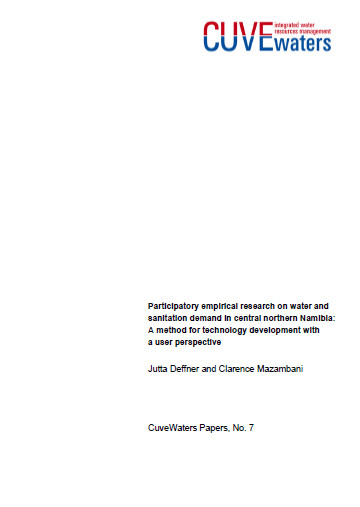Participatory empirical research on water and sanitation demand in central northern Namibia: A method for technology development with a user perspective
 |
report Sep 2010 ; 25 pages
Aut. Jutta Deffner & Clarence Ntesa Mazambani
Ed. ISOE - Frankfurt am Main
Downloadable format: PdF
Downloadable from the publisher
Abstract:
Improvements in water infrastructure in developing countries are of major importance for achieving access to clean water. CuveWaters, a research based IWRM project, currently underway in Namibia, is testing different technical options to de-centralise water supply and upgrade sanitation. The Cuvelai Basin is affected by highly variable precipitation, mostly saline groundwater and a lack of perennial rivers. Water management is characterised by strong dependency on a water pipeline. Finding ways to improve the situation calls for a good grasp of the local situation regarding water utilisation patterns. Technologically sophisticated concepts can easily clash with users’ socio-cultural needs and everyday behaviour as well as their understanding of planning and maintenance. A demand-responsive approach has therefore been developed. It combines a qualitative socio-empirical perspective with participatory planning. This paper discusses method development, empirical application and results. The approaches aim is to support mutual learning as a basis for a sustainable change process.
Keywords: |
access to sanitation (CI) (DT) (ET) (ope) , access to water (CI) (DT) (ET) (ope) |
Country: |
Publisher/Broadcaster: |
|
ISOE
-
Institute for Social-Ecological Research - Frankfurt am Main - Germany |
If there is a broken link, we will be pleased to receive a message: communication@pseau.org